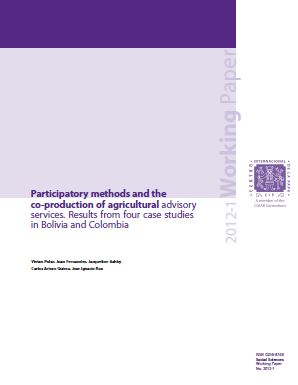This working paper reports on a study carried out in 2010-2011 to document, analyze and compare four cases of the implementation of two participatory methods (the SEP and CIAL methods) to improve the inclusion and relevance of agricultural research and extension for the poor. Use the methods was analyzed as a process of co-production in which farmers, NGOs and the public sector share the costs of agricultural advisory service provision. The analysis assesses to what extent participatory methods provide protocols that facilitate co-production. In all cases, the participatory method helped to create pre-conditions for co-production by catalyzing powersharing and the development of new rights and responsibilities in the performance of coproduced agricultural advisory services. In several respects the utility to the poor of technology and extension services improved. But the absence of external support from powerful decisionmaking bodies with control over important resources restricted the benefits poorly organized farmers could obtain from co-production of these services, even when public policy in support of their participation was in place. While use of SEP or CIAL cannot overcome the structural power inequalities that lead research and extension to neglect poor farmers’ needs, the methods undoubtedly trigger a process in which farmers become more assertive about what they want and less accepting of bad quality agricultural advisory services, poorly oriented training, inappropriate technologies, untested recommendations and unmet election promises.
Participatory methods and the coproduction of agricultural advisory services. Results from four case studies in Bolivia and Colombia.
Citation: Polar, V.; Fernández, J.; Ashby, J.; Quiros, C.A.; Roa, J.I. 2012. Participatory methods and the coproduction of agricultural advisory services. Results from four case studies in Bolivia and Colombia. International Potato Center (CIP), Lima, Peru. Social Sciences Working Paper No. 2012-1. ISSN 0256-8748. 107 p.
2018-02-06
South America
Bolivia, Colombia
working_paper

